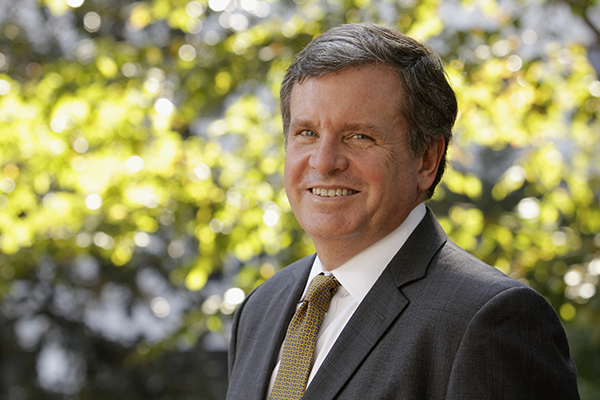Are we in or out?
Medicaid expansion depends on reform commission and the governor’s race
Are we in or out?
Medicaid expansion depends on reform commission and the governor’s race

That’s good news for supporters of the proposed expansion, which could bring another 400,000 Virginians into the Medicaid system. Opponents, though, are fighting to stop the move, which they criticize for being too expensive and for creating a financial burden that the commonwealth eventually could have to pay.
The key work right now is being done by the Medicaid Innovation and Reform Commission, created in the General Assembly session this year and composed of state legislators. The group started meetings in June and will make its recommendations later this year. The Affordable Care Act — Obamacare to many — promises to cover all the state’s costs for expanding Medicaid during the first three years, then eventually phasing down to 90 percent in subsequent years. Given that Virginia has about 1 million uninsured adults, it’s a tempting deal.
The decision Virginia makes on accepting that deal will depend on two outcomes: the reform commission’s deliberations and this fall’s race for governor. So the question has an unusually large dose of money and politics. “Health-care reform has not historically been this politically fraught,” says Christopher S. Bailey, senior vice president of the Virginia Hospital and Healthcare Association. The VHHA supports expanding Medicaid, in large part because hospitals have been bearing much of the cost of treating uninsured patients. Bailey says the group believes “the policy argument comes down strongly in favor of both reform and expansion. It’s not one or the other.”
VHHA’s argument in favor of expansion is backed by a study it commissioned from Richmond-based Chmura Economics & Analytics. The report says that the total economic impact of Medicaid expansion would average $3.9 billion a year from 2014 to 2019.
McAuliffe, yes; Cuccinelli, no
Gov. Bob McDonnell staked out his general opposition to the Medicaid expansion last winter. He outlined a series of Medicaid reforms he wants, saying he wouldn’t support expanding the program in Virginia if it meant “increasing the immoral national debt.”
By the time the state’s reform commission finishes its work, though, McDonnell’s four-year term will be winding down. The next governor’s position on Medicaid will be critical. Republican Ken Cuccinelli opposes expansion, while Democrat Terry McAuliffe supports it. “This past General Assembly delegated the responsibility to the panel, but a future one isn’t bound to that,” Bailey says. “And a new governor would have a say.”
Compared with other states, Virginia’s current Medicaid program is not particularly generous. The state ranks 24th in Medicaid spending per participant, and 48th in spending per capita. Plus, the program provides no coverage for childless adults. “Virginia’s been a state that’s had a very, very lean and restrictive Medicaid program,” says Jill Hanken, an attorney with the Richmond-based Virginia Poverty Law Center. Taking the federal Medicaid expansion offer “would open up the program primarily for very low-income adults who can’t get Medicaid no matter how poor they are.”
Long-term issue
What’s more, rising costs in Medicaid spending at the state level are being driven by long-term care for the elderly and the disabled, not by those who would be covered under the proposed expansion, Hanken says. Patients in long-term care under Medicaid make up only 7 percent of the total enrollment, but they represent 35 percent of the money spent, according to the state’s Department of Medical Assistance Services. Hanken says that in recent years the General Assembly has expanded services for Medicaid patients in that category. “It’s not fair to say that the costs are skyrocketing out of control when in fact it has been through deliberate legislative action that we’ve expanded elderly long-term care,” she says.
Hanken makes a financial argument by noting that Virginians are already paying a price for the medical care that uninsured persons need. Their care often costs more because it takes place in the emergency room. “We all pay when people are uninsured,” she says. Come January those states that have opted into the Medicaid expansion will start receiving federal dollars. “We’d be losing $5 million a day for any delay in implementing the Medicaid expansion. This is an opportunity that would be shameful to not take advantage of.”
The state’s Medicaid program has gotten much more expensive in recent years, which gives credence to critics of the extra spending. Enrollment is up 80 percent in the past 10 years, and program costs reached $5.5 billion last year. Opponents are deeply distrustful of the promise of federal funds and worry about giving away any state control over the program.
At the reform commission’s first meeting in June, the Virginia chapter of the conservative group Americans for Prosperity held a rally in opposition to expanding the state’s Medicaid program and planned another rally for the commission’s August meeting. Dave Schwartz, the chapter director, says expanding Medicaid only means adding more people to a health-care system that already doesn’t work. Some doctors won’t accept new Medicaid patients because the payments from Medicaid are too low, he notes. “Let’s get folks into jobs, let’s get the economy moving again so people can find good-paying jobs where they can find private health insurance at a reasonable cost.”
Bailey says he understands why opponents are skeptical of expanding the federal program. “The political risk is that once you say yes, can the federal government ever scale back? That’s the leap-of-faith difficulty that a lot of officials are having. Even if they’re sympathetic, they’re having a hard time expanding the Medicaid program.”
Nonetheless, the clock is ticking, Bailey says. While states can choose to opt in at any time, the earmarked federal money is going to be distributed starting next January, so states that aren’t in line then will miss the first rounds of funding. “By waiting, you might be forgoing the savings, but the tax and fee increases for the ACA and payment reductions to providers are all rolling forward,” he says. So we’re paying in, but not getting anything out.”
g

















